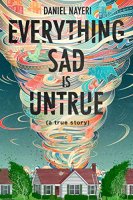 Everything Sad Is Untrue: (a true story) by Daniel Nayeri (Levine Querido, 2020)
Everything Sad Is Untrue: (a true story) by Daniel Nayeri (Levine Querido, 2020)
Sometimes the AI—which Porter, seeing with eyes clearer than most, insists stands not for Artificial Intelligence but for Automated Idiots—sometimes the AI gets it right when it recommends a book for me. Usually it's 'way off base, nowhere near the skill of, say, my sister-in-law or my son-in-law in discerning what I might enjoy. But sometimes it makes a surprising score.
I was searching for a book for the above-mentioned son-in-law when Everything Sad Is Untrue popped up on Amazon. Nayeri's book caught my eye because the title echoes Sam's words near the end of The Lord of the Rings:
“Gandalf! I thought you were dead! But then I thought I was dead myself. Is everything sad going to come untrue?"
That was just enough to get me to click on the link. Which just goes to show how misleading titles can be. Still, it's not unfitting.
Everything Sad Is Untrue ticks off an awful lot of my "avoid-this-book" checkboxes:
- Modern fiction (published in 2020; anything less than 50 years old is modern to me and I find the signal-to-noise ratio very poor in that group)
- Young Adult fiction (what I said about poor signal-to-noise ratio goes a hundred-fold for YA fiction; I find most YA books insipid, narcissistic, and rarely appropriate for young people)
- Won "Best Book of the Year" from a whole slew of entities like NPR, the New York Times, Today, and Amazon (not organizations that inspire my confidence, rather the opposite)
- Has reviews that include accolades such as, "implementing a distinct literary style and challenging western narrative structures" and "urges readers to speak their truth" (phrases guaranteed to turn me off)
Despite all this, I clicked on Amazon's "Look Inside" and read the first few pages of the book. That actually made things worse, as the literary style is clearly "middle school Young Adult fiction," which, as you can guess, normally makes me run away, fast. And yet ... the story was intriguing enough, even in that small sample, to make me check it out of the library. I wouldn't have bought it, but this is one of the things libraries are good for.
And here's the thing: I don't care what the reviewers say, what the putative grade level is for the book, or how many middle school teachers assign it to their classes, this is not a Young Adult book. It's an adult semi-autobiography, written in the style of books aimed at middle-grade children. I say "semi-autobiography" because it's not written in a style normally associated with biographies, and it's classed as fiction. Here's what the author has to say about that:
I figure you want to know which parts are true. The short answer is all of it is true. I have changed the names of some people ... combined others ... and played a tiny bit with the timeline. But the elements are all—to my recollection—true.... Perhaps I misunderstood a great deal, in the way that a child misunderstands, but those are the myths I believed at the time. This was my life, as I experienced it, and it is both fiction and nonfiction at the same time.
Like poetry.
Daniel Nayeri, whose name was Khosrou until his mother got tired of Americans mispronouncing it, was born Persian, and if that makes you think of the Rubaiyat of Omar Khayyam and of Scheherazade I'm sure the author would be pleased. The son of a dentist and a doctor, he lived six years of a good life in Iran, until 1988 when his mother was forced to leave behind her husband and a thriving medical practice to flee with her two young children, a single suitcase, and a death-sentence fatwa on her head for the crime of having become a Christian.
Khosrou's tale is told through his childish memories, interwoven with tales of Persian folklore and Iranian culture. It's probably worth reading the book for that alone, because it doesn't assume much knowledge on the part of the reader. Those of us whose knowledge of modern Iran is largely limited to the tumultous and tragic times into which Khosrou was born can benefit from this more personal, if limited, glimpse. Anyone can benefit from this view of refugee life from a child's point of view. It's especially moving for me, because I know three people who fled Iran during that time, whose stories give credibility to Everything Sad Is Untrue.
Here's a 10-minute video with Daniel and his mother. It's well worth watching, whether you read the book or not.


